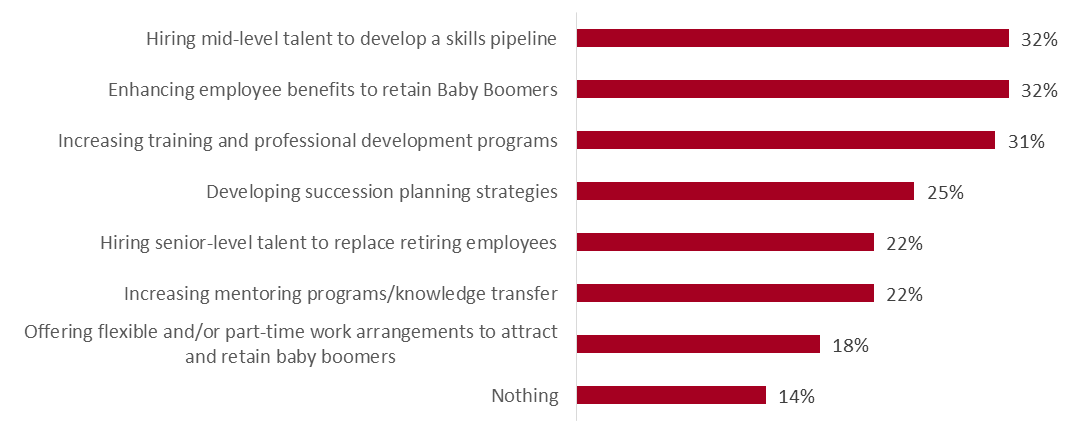85% of CFOs say the departure of Baby Boomers in the job market will have a negative impact on their company over the next two years.
Independent research by specialised recruitment company Robert Half reveals that 96% of New Zealand businesses are anticipating a skills gap due to the retirement of the Baby Boomer generation (born between 1946-1964).
- 96% of New Zealand CFOs and financial directors foresee a potential skills gap due to the retirement of the Baby Boomer generation.
- 85% are concerned that the departure of Baby Boomers in the job market will have a negative impact on their company over the next two years.
- Top three measures to prepare for this potential skills gap are hiring mid-level talent to develop a skills pipeline (32%), enhancing employee benefits to retain Baby Boomers (32%) and increasing training and professional development programs (31%).
The research also shows that 85% of New Zealand finance leaders are concerned that the loss of the Baby Boomers will have a negative impact on their company over the next two years.
Megan Alexander, General Manager of Robert Half New Zealand said: "With New Zealand’s Baby Boomer generation retiring over the coming years, companies are increasingly anxious about skills and talent shortages. In order for companies not to lose the expertise and know-how of their experienced employees, companies have to make talent management a priority.”
To ensure they can manage the loss of the Baby Boomer generation on the workforce, 86% of finance leaders are taking measures to counter the potential skills gap. They are making significant commitments to invest in the next generation and are supporting them through measures such as implementing training and professional development programs (31%).
Companies are also considering external solutions and plan to recruit mid-level (32%) and senior-level (22%) employees who, via the necessary knowledge transfer, can be used to the maximum extent within the company in the short term.
Megan Alexander continued: "In meeting this challenge the first step for Kiwi companies will be to undertake a thorough inventory of the core skills they have in-house and the ones they will have to replace. Potential successors should subsequently be readied in time by targeted training and mentoring programs.”
“For skills that are not available internally, companies will have to recruit new staff members that possess the necessary skills and expertise. This will create new and additional job opportunities as companies look at both senior and less senior profiles to fill these roles.”
Although the official retirement age in New Zealand is set at 65 years, many Baby Boomers will continue to work for several years to come. Businesses are therefore making efforts to attract and retain this generation in the workforce longer by enhancing their employee benefits (32%) or by offering flexible and/or part-time work arrangements (18%).
Megan Alexander said: “Baby Boomers have built up extensive experience and specific skills. It’s therefore not surprising that businesses wish to retain them as long as possible. Offering interim or part-time contracts to employees nearing retirement can be an ideal way to keep the knowledge of Baby Boomers in the company while at the same time offering the necessary flexibility.”
How is your company preparing for the potential 'skills gap' resulting from the retirement of the Baby Boomer generation?

Source: independent survey commissioned by Robert Half among 100 New Zealand CFOs and finance directors – multiple answers allowed
##
About the research
The annual study is developed by Robert Half and was conducted in June 2015 by an independent research firm, surveying 100 Chief Financial Officers (CFO) and finance directors in New Zealand. This survey is part of the international workplace survey, a questionnaire about job trends, talent management and trends in the workplace.
MEDIA CONTACT
Katherine Mills
Public Relations Manager, Asia Pacific
P: +61 2 8028 7757
E: [email protected]